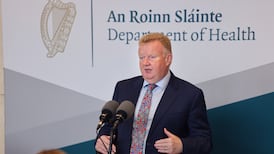A majority of spina bifida patients undergoing spinal surgery at Crumlin children’s hospital required emergency returns to the operating theatre, a review shows.
A majority of the 11 children also suffered post-operative infection, the review by Children’s Health Ireland (CHI) shows.
However, there were no deaths and none of the children required the removal of metal implants subsequent to their original procedure.
Wound infection was the only significant complication among the affected children emerging from the review, according to CHI. It says the rate recorded falls within “published rates” for spina bifida spinal surgery, though changes have been made to the way wounds are managed.
“It was encouraging that there were no metalwork failures or need for removal of metalwork,” CHI added. “Members of the CHI executive have seen the report and are assured by the results.”
The review of surgeries in Crumlin began last December after concerns had emerged about high complication rates for spinal surgeries at Temple Street children’s hospital.
That review, published last week, reported on several major incidents at Temple Street, including the death of a child. Over 80 per cent of the cases reviewed there required an unplanned return to theatre, and 75 per cent suffered wound infection.
The care of spinal bifida patients who were in Temple Street is now being transferred to Crumlin, though some may require treatment abroad due to long wait times in the Irish health service.
Patient groups had called for the publication of the Crumlin report, given the problems in Temple Street and the fact children’s care was being transferred to Crumlin.
In contrast to Temple Street, where staff raised concerns about high complication rates from the work of one of their colleagues, no concerns have been raised by staff in Crumlin about its spinal surgery outcomes.
Six of the 11 children were returned to the operating theatre on an emergency list; four of these returned between one and nine times, and two had to return between 10 and 20 times.
The average length of stay in hospital after an initial operation was 25 days. One child remained in hospital for 151 days, and 97 days after their operation. Five of the children required a stay in paediatric ICU, ranging in length from 24 hours to two days.
While four children had no post-operative complications, six suffered infection. Other complications included one child with a significant nutritional deficit over a long period; two with urinary tract infections; one with a leak of fluid from the spinal cord; and one with “significant psychological distress”.
The review included all patients with spina bifida who underwent spinal surgery from January 1st, 2020, and December 31st, 2022, and was carried out in a similar manner to the Temple Street review.
Over this period, 96 surgeries were carried out on spina bifida patients, of which 79 were spinal surgeries involving 13 patients. The 11 patients that met the criteria for review ranged in age from five to 16 years.








